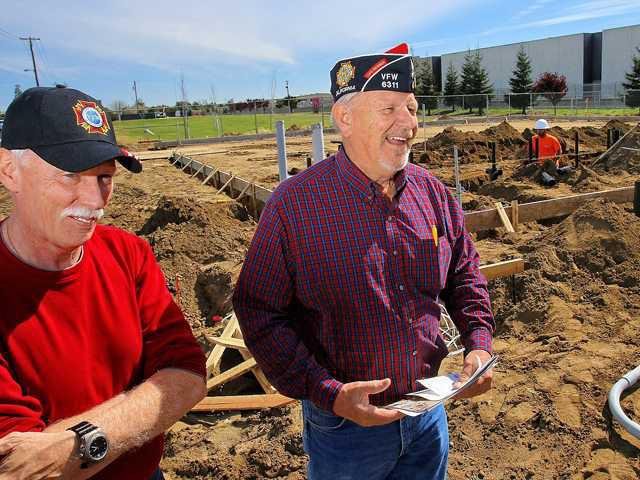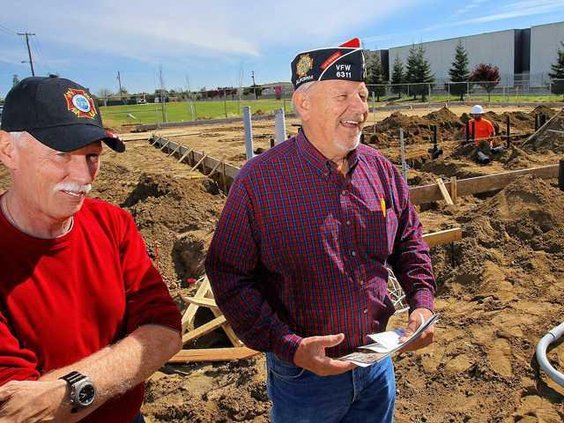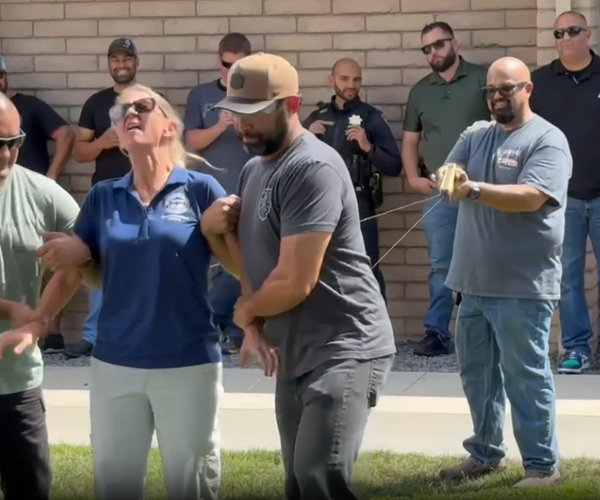Carlon Perry — a former Manteca mayor that at one time was a co-publisher of the weekly Lathop-Manteca Sun Post newspaper — passed away Friday.
The Korean War veteran who parlayed a successful career as a Manteca High pitcher into a farm league contract with the Los Angeles Dodgers was 78.
Perry played a key role in securing the first ever home for the Veterans of Foreign Wars Jimmie Connors Post 6311, the Manteca Veterans Center that was dedicated in 2015 on Moffat Boulevard.
He also was responsible for a major increase of the post’s membership ranks that earned it top national growth owners for several years.
The former mayor also led the East Union Cemetery District board after leaving office.
Besides being co-publisher of the Sun-Post, he shared ownership of two weeklies in Santa Cruz County in Scotts Valley and Felton.
Several years before running for council he owned the five-day-a-week Colusa Sun Hearld.
Prior to that he worked for the Manteca Bulletin, the now-defunct Manteca News, and Ceres Courier.
Perry served as a Manteca City Planning Commission member before making a successful run for the Manteca City Council in 1992.
Two years later, Perry made a bid for the mayor’s seat.
His opponent was fellow councilman Bill Perry.
Not only did the two stridently disagree on a majority of issues, but the fact both shared the same last name led some to believe that could have confused some voters and possibly affected the outcome that saw Bill Perry winning by less than three dozen votes.
Perry served as a councilman until 1998 when he defeated Willie Weatherford for mayor in 1998.
Four years later, Weatherford defeated Perry to take over the mayor’s post.
Weatherford ran unopposed in 2006 but then challenged Weatherford in 2010 and lost.
That was his final excursion into campaign for public office.
Despite the strong differences Perry and Weatherford had in terms of city politics, they put that aside to work to make the Manteca Veterans Center a reality during Weatherford’s third and final four-year term as mayor.
It was Perry who asked Weatherford to join him for coffee at the Waffle Café, the first ever such sit down between the two. It was when Perry shared his vision.
And by the end of the meeting, Weatherford made it clear he’d work to find the means for the city to make it a reality.
In what was arguably the shortest turnaround for such a project in at least three decades at the time, the new post home that doubles as the Manteca Community Center was dedicated on Veterans Day in 2015 before a crowd in excess of 1,000.
From the time Perry became post commander to two years after the dedication, the VFW’s membership roll swelled from 60 to 660.
Perry’s political impacts
Perry’s term as mayor was viewed by many as tumultuous.
In historical references, it was relatively calm as opposed to the political blow-up that in 1982 that led to the recall of Mayor Trena Kelley as well as council members Rick Wentworth and Bob Davis.
It also was not as heated as the following eight years where marathon meetings would stretch beyond midnight and simple items such as approving minutes of previous meeting could take as long as an hour for council members believe.
That said, Perry is believed to have presided over the longest council meeting on record that went on for almost 8½ hours from 7 p.m. to 3:18 a.m.
But no matter how you deal the cards, Perry had a significant impact in the shaping of Manteca politics and city government.
*1. You can make the argument he is one of the reasons why Manteca for years ran “lean and mean” in terms of municipal staffing.
Perry would contend staff didn’t listen very well but he needed to ask himself how things would have been different if he wasn’t there carping about spending all the time when he was on the council. As for his detractors, you can’t argue that staff didn’t try to prove Perry wrong and in doing so made themselves a bit more efficient.
*2. His almost legendary — in his own words “hell, no” — approach to budgets when he was on the council may have set the stage for the relative fat-free status that the city finds itself in.
Everyone will read it differently but Manteca didn’t go on a general fund spending spree when other cities did.
Who do you credit?
Based on those who weren’t wild about some of the positions of the man they called “Mayor No” you’ve got to give him his due for keeping things in check although Perry believes things still got out of hand. There was a huge disagreement on that point but he still deserves credit for keeping everyone on their toes.
*3. Privatization moves by Perry and his ideological colleague former Councilwoman Denise Giordano certainly intensified efforts by municipal workers to redouble efforts to prove they were among the most efficient around the region.
If you doubt that, go back to 2010 when the Parks & Rec staff — which already was producing more work per employee than other cities in the region — went back to the drawing board when Perry went on one of his crusades for privatization.
They came back with even more ways to cut costs. And if you doubt there wasn’t more room to cut, reflect on what happened in the aftermath of the budget crisis triggered by the Great Recession. You may not like it, but things are working.
Perry also gets credit for creating the privatization movement.
Prior to Giordano and him being on the council, the only thing privatized was the city attorney’s office. Now part of the parks and recreation system is privatized through Big League Dreams as well as the operation of the municipal golf course.
Giordano, by the way, was the one who first came up with the idea of the private-public sector partnership. Weatherford was the one who drove it home.
*4. Perry personified a poker face player from all accounts in the BLD negotiations getting Manteca a bigger slice of the revenue pie than the private firm intended to offer up.
Perry when he lost the 2010 mayor’s race said “that doesn’t matter now.”
Well, it did.
The pressure a solid opposition can apply can bring boards and councils to a better place than either side envisioned. It’s a thing called compromise.
Perry’s style in how he went about getting his point across during council service was undoubtedly an albatross around his neck in the eyes of some voters.
He was vilified as being sneaky and underhanded. If you look at it from one perspective then perhaps that is true.
But there is no one who has known Perry — friend, foe or indifferent — who honestly couldn’t tell you where he stood.
When the bottom like came, he voted against budgets because ultimately they did not meet his litmus test.
Perry may not be viewed as the architect of the Manteca Miracle but he certainly was the guy who kept nagging — as is needed one might add — about whether the city could afford what they were doing or if they really needed something.
In the end, a lot of projects Perry opposed went forward. But they did do with people acutely aware there was someone out there who was going to keep looking at every dollar and penny spent.
To contact Dennis Wyatt, email dwyatt@mantecabuleltin.com






